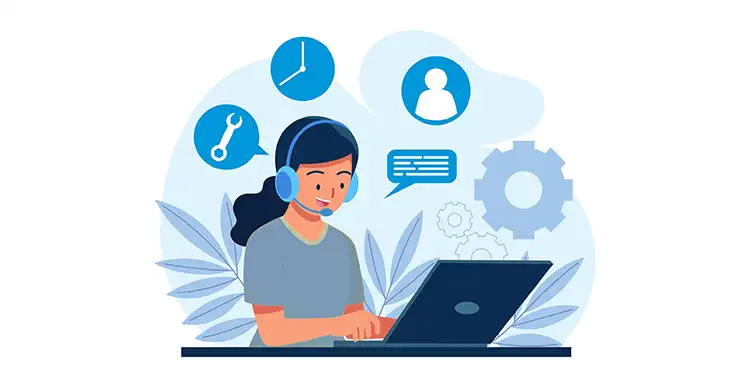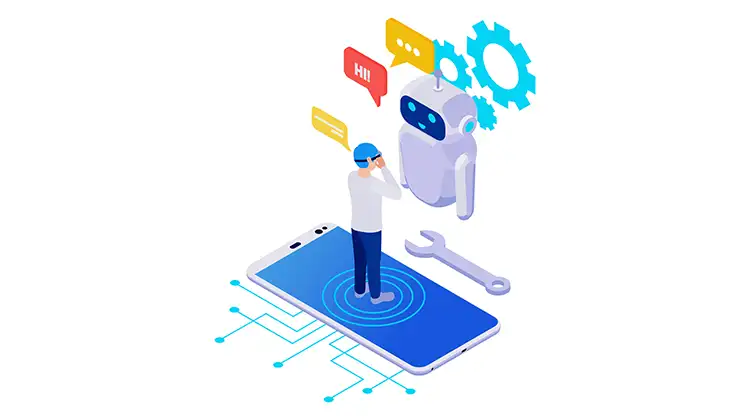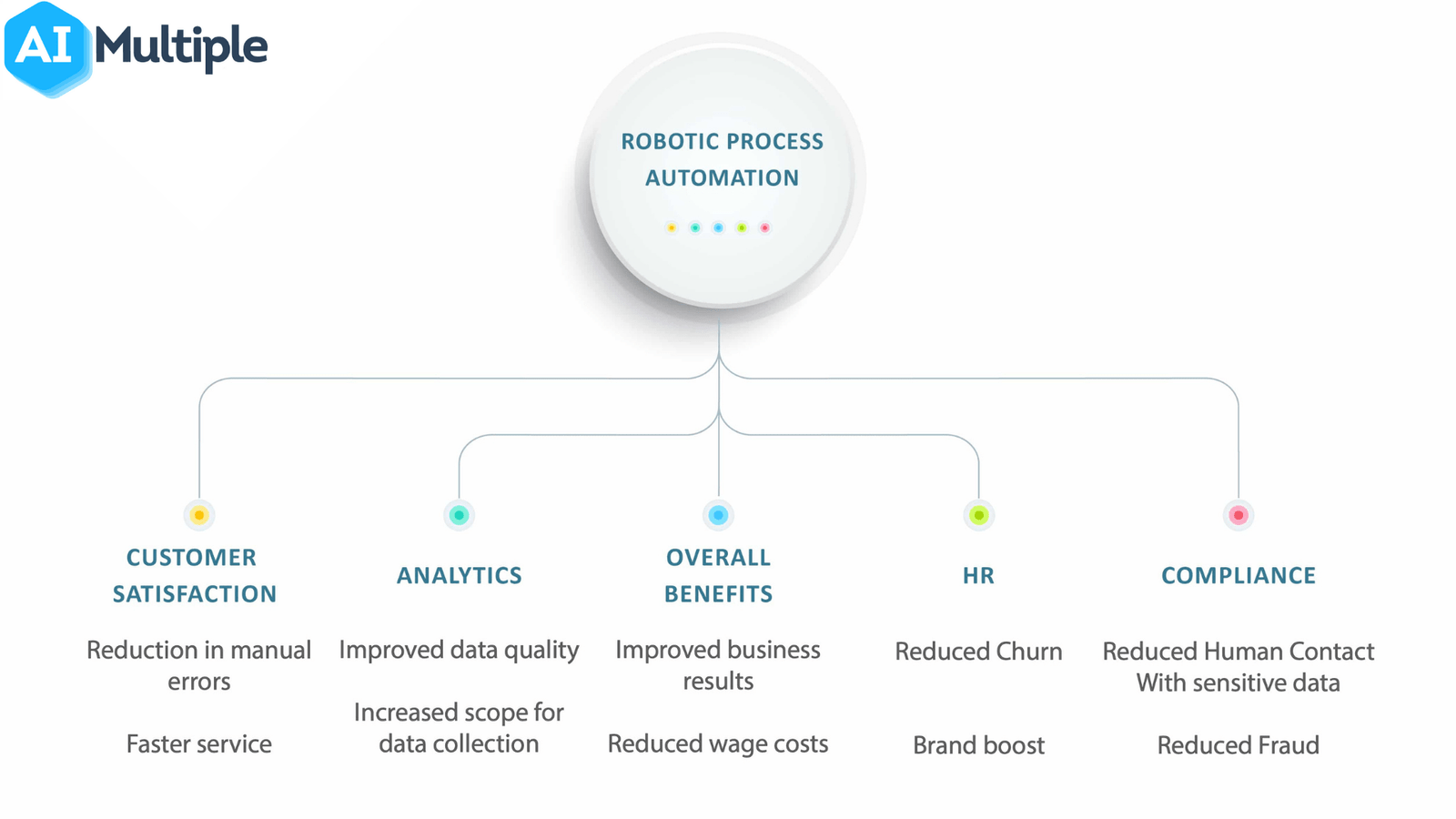
In today’s fast-paced and technology-driven world, customer service efficiency plays a crucial role in the success of any business. With the advancements in Artificial Intelligence (AI) and Robotic Process Automation (RPA), companies are now able to revolutionize their customer service operations like never before. In this article, we will explore the remarkable impact of AI and RPA on customer service efficiency, and how these technologies are changing the game for businesses worldwide.
AI, with its ability to mimic human intelligence, is transforming customer service in various ways. From chatbots that provide instant and personalized responses to customer queries, to machine learning algorithms that analyze vast amounts of data to identify patterns and make accurate predictions, AI is streamlining and enhancing customer interactions. Additionally, RPA automates repetitive and mundane tasks, such as data entry and processing, freeing up human agents to focus on more complex and value-added activities. By combining AI and RPA, businesses can improve response times, reduce errors, and deliver a seamless and satisfactory customer experience.
With the growing importance of online presence and digital interactions, businesses need to leverage AI and RPA to stay ahead of the competition. By embracing these technologies, companies can not only enhance customer service efficiency but also gain valuable insights from customer data to drive business growth. So, let’s dive deeper into the world of AI and RPA, and discover the incredible benefits they bring to customer service operations.
The Impact of AI and RPA on Customer Service Efficiency
Artificial Intelligence (AI) and Robotic Process Automation (RPA) are revolutionizing the way customer service is delivered. AI-powered chatbots and virtual assistants can handle customer inquiries round the clock, improving response times and reducing customer wait times. RPA streamlines repetitive tasks, freeing up customer service agents to focus on more complex issues. This combination of AI and RPA leads to enhanced customer service efficiency, ensuring faster problem resolution and higher customer satisfaction rates.

How To Harness the Impact of AI and RPA on Customer Service Efficiency
- Step 1: Implement AI-powered chatbots or virtual assistants on your customer service platform.
- Step 2: Train the AI system to understand and respond to common customer inquiries effectively.
- Step 3: Integrate RPA to automate repetitive tasks, such as data entry or order processing.
- Step 4: Continuously monitor and analyze the AI and RPA systems’ performance to identify areas for improvement.
- Step 5: Regularly update and refine the AI and RPA systems based on customer feedback and evolving needs.
Harnessing the power of AI and RPA in customer service can significantly boost efficiency and enhance the overall customer experience.
Comparison: AI vs RPA for Customer Service Efficiency
| AI | RPA |
|---|---|
| AI-powered chatbots provide instant responses to customer inquiries. | RPA automates repetitive tasks, freeing up human agents’ time. |
| AI can learn and improve over time, becoming more accurate in addressing customer needs. | RPA ensures consistent and error-free execution of tasks. |
| AI can handle a wide range of customer inquiries simultaneously. | RPA excels in handling structured and rule-based processes. |
| AI enables personalized interactions and recommendations based on customer data. | RPA reduces the likelihood of human error and increases operational efficiency. |
Both AI and RPA play crucial roles in improving customer service efficiency, but their strengths lie in different areas. Implementing a combination of AI and RPA can yield the best results, allowing businesses to provide exceptional customer support while optimizing their operational processes.

The Impact of AI and RPA on Customer Service Efficiency
Artificial Intelligence (AI) and Robotic Process Automation (RPA) have revolutionized various industries, and their impact on customer service efficiency cannot be overstated. These technologies have transformed the way businesses interact with their customers, enhancing service delivery and streamlining processes. In this article, we will explore the profound impact of AI and RPA on customer service efficiency and how businesses can leverage these technologies to provide exceptional customer experiences.
Enhanced Speed and Accuracy
One of the key benefits of AI and RPA in customer service is the ability to handle a large volume of customer inquiries and requests with remarkable speed and accuracy. AI-powered chatbots and virtual assistants can provide instant responses to customer queries, reducing wait times and improving overall customer satisfaction. These intelligent systems can quickly analyze customer data, identify patterns, and provide personalized solutions, ensuring that customers receive accurate and relevant information in real-time.
Furthermore, AI and RPA technologies enable automation of repetitive and mundane tasks, such as data entry and order processing. By automating these processes, businesses can significantly reduce errors and delays, resulting in faster and more accurate service delivery. This not only enhances customer satisfaction but also frees up human agents to focus on more complex and value-added tasks, ultimately improving overall operational efficiency.
Seamless Omnichannel Support
In today’s digital age, customers expect seamless and consistent support across multiple channels, including phone, email, chat, and social media. AI and RPA technologies enable businesses to provide a unified and integrated omnichannel experience, ensuring that customers can engage with the company through their preferred channels without any friction.
For instance, AI-powered chatbots can be seamlessly integrated into various messaging platforms and websites, offering 24/7 support to customers. These chatbots can handle routine inquiries, provide product recommendations, and even complete transactions, all while maintaining a conversational and personalized interaction. This level of convenience and accessibility not only enhances customer satisfaction but also reduces the workload on human agents, allowing them to focus on more complex customer issues.
The Benefits of AI and RPA in Customer Service Efficiency
The integration of AI and RPA in customer service brings numerous benefits to businesses, enhancing efficiency and improving customer experiences. Here are some key advantages:
1. Improved Response Times: AI-powered chatbots and virtual assistants can provide instant responses, reducing customer wait times and ensuring timely support.
2. Enhanced Personalization: AI technologies can analyze customer data and preferences to offer personalized recommendations and solutions, creating more personalized and tailored experiences.
- Improved Response Times
- Enhanced Personalization
- 24/7 Availability
3. 24/7 Availability: AI-powered chatbots are available round-the-clock, allowing customers to seek assistance at any time, regardless of business hours.
4. Efficient Task Automation: RPA technologies automate repetitive and manual tasks, reducing errors and freeing up human agents to focus on more complex issues.
5. Data-Driven Insights: AI and RPA technologies can analyze large volumes of customer data, providing valuable insights for businesses to improve their products and services.

The Future of AI and RPA in Customer Service Efficiency
The impact of AI and RPA on customer service efficiency is only expected to grow in the future. As these technologies continue to evolve, businesses will have even more opportunities to enhance customer experiences and streamline their operations. The integration of AI and RPA can lead to more sophisticated chatbots, advanced data analytics, and seamless integration with other emerging technologies such as voice assistants and augmented reality.
Furthermore, advancements in natural language processing and machine learning will enable AI systems to understand and respond to customer queries with even greater accuracy and context. This will result in more human-like interactions and further improve customer satisfaction.
In conclusion, AI and RPA have revolutionized customer service efficiency by enabling faster response times, enhanced personalization, and efficient task automation. Businesses that embrace these technologies are poised to deliver exceptional customer experiences and gain a competitive edge in today’s digital landscape.
The Impact of AI and RPA on Customer Service Efficiency
- AI and RPA technologies can greatly improve the efficiency of customer service operations.
- By automating repetitive tasks, AI and RPA free up customer service agents to focus on more complex and meaningful interactions with customers.
- AI-powered chatbots can provide instant and accurate responses to customer queries, reducing wait times and improving overall satisfaction.
- RPA can streamline back-end processes, such as data entry and order processing, resulting in faster and more accurate service delivery.
- The combination of AI and RPA can lead to significant cost savings for businesses while enhancing the customer experience.
Frequently Asked Questions
What is the role of AI in customer service efficiency?
AI, or artificial intelligence, plays a crucial role in improving customer service efficiency. With AI-powered chatbots and virtual assistants, businesses can automate repetitive tasks and provide instant support to customers. These AI systems are capable of understanding natural language and can handle multiple customer queries simultaneously, reducing the need for human intervention. By leveraging AI, businesses can enhance their response time, resolve customer issues more efficiently, and ultimately provide a better customer experience.
Moreover, AI can analyze customer data and generate valuable insights for businesses. By understanding customer preferences, AI can help personalize interactions and recommend tailored solutions. This not only improves customer satisfaction but also increases the chances of customer retention. Overall, AI empowers businesses to streamline their customer service operations, leading to improved efficiency and enhanced customer relationships.
How does RPA impact customer service efficiency?
Robotic Process Automation (RPA) is another technology that greatly impacts customer service efficiency. RPA involves the use of software robots to automate manual and repetitive tasks within customer service operations. These robots can handle tasks such as data entry, order processing, and even complex workflows, freeing up human agents to focus on more strategic and complex customer inquiries.
By implementing RPA, businesses can significantly reduce response times, minimize errors, and increase operational efficiency. RPA robots work 24/7 without breaks, ensuring that customer inquiries are promptly addressed. This automation not only improves efficiency but also helps businesses scale their customer service operations without the need for additional human resources.
What are the benefits of AI and RPA in customer service efficiency?
The use of AI and RPA in customer service brings numerous benefits to businesses. Firstly, the automation of repetitive tasks through AI and RPA allows customer service agents to devote more time to complex and high-value interactions, resulting in improved customer satisfaction.
Secondly, AI-powered chatbots and virtual assistants provide instant and accurate responses to customer queries, reducing wait times and improving overall response times. This leads to enhanced customer experiences and increased customer loyalty.
Furthermore, AI and RPA enable businesses to gather valuable customer data and generate actionable insights. By analyzing customer behavior patterns and preferences, businesses can personalize their interactions and offer tailored solutions, further enhancing customer satisfaction and loyalty.
Overall, the adoption of AI and RPA technologies in customer service efficiency leads to improved operational efficiency, reduced costs, and better customer experiences.
Are there any challenges in implementing AI and RPA in customer service?
While AI and RPA offer numerous benefits, there are some challenges in implementing these technologies in customer service. One major challenge is ensuring the accuracy and reliability of AI systems. AI-powered chatbots and virtual assistants need to be trained extensively to understand and respond accurately to customer queries. Without proper training, these systems may provide incorrect or irrelevant information, leading to frustrated customers.
Another challenge is the integration of AI and RPA with existing customer service systems. Businesses need to ensure seamless integration to avoid disruptions in customer service operations. This requires proper planning, testing, and coordination with IT departments.
Additionally, there may be resistance from employees who fear that AI and RPA will replace their jobs. It is important for businesses to communicate the benefits of these technologies and provide training to employees to adapt to new roles and responsibilities.
What is the future of AI and RPA in customer service efficiency?
The future of AI and RPA in customer service efficiency looks promising. As technology continues to advance, AI systems will become even more intelligent and capable of handling complex customer inquiries. Natural language processing and machine learning algorithms will enable AI systems to understand customer needs and preferences more accurately, leading to highly personalized and efficient customer interactions.
Similarly, RPA will continue to evolve, enabling businesses to automate more complex and intricate tasks within customer service operations. The integration of RPA with AI will further enhance efficiency by automating end-to-end customer service processes.
Moreover, AI and RPA will play a vital role in the rise of self-service customer support. Customers will have access to AI-powered self-help tools and virtual assistants, reducing the reliance on human agents for routine inquiries. This will not only improve efficiency but also empower customers to resolve their issues independently.
In conclusion, the future of AI and RPA in customer service efficiency is bright, with the potential to revolutionize the way businesses interact with their customers. By embracing these technologies, businesses can enhance their efficiency, improve customer satisfaction, and stay ahead in the competitive market.

Final Summary: The Game-Changing Impact of AI and RPA on Customer Service Efficiency
As we bid farewell to this enlightening exploration of the impact of AI and RPA on customer service efficiency, it’s clear that we’re witnessing a revolutionary transformation in the way businesses interact with their customers. The integration of artificial intelligence and robotic process automation has paved the way for unprecedented levels of efficiency, personalization, and convenience in customer service.
From chatbots that can instantly resolve simple queries to intelligent automation systems that streamline complex processes, the possibilities seem endless. With AI and RPA, businesses can not only enhance their customer service operations but also boost customer satisfaction and loyalty. By harnessing the power of cutting-edge technologies, companies can deliver faster response times, more accurate solutions, and personalized experiences that leave a lasting impression on their customers.
However, it’s important to remember that while AI and RPA can revolutionize customer service, they are not meant to replace human interaction. Instead, they serve as valuable tools that empower customer service agents to focus on more complex and meaningful tasks. By automating repetitive and mundane tasks, AI and RPA allow human agents to dedicate their time and expertise to solving intricate problems, building relationships, and providing emotional support when needed.
In conclusion, the marriage of AI and RPA with customer service has ushered in a new era of efficiency and effectiveness. By embracing these technologies, businesses can create seamless and memorable customer experiences that set them apart from the competition. As we move forward, it’s crucial for companies to stay updated with the latest advancements in AI and RPA, continually adapting and improving their customer service strategies to meet the evolving needs and expectations of their customers. Together, humans and machines can work hand in hand to deliver exceptional customer service in this digital age.
